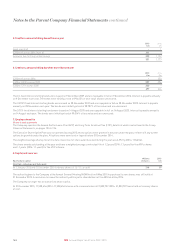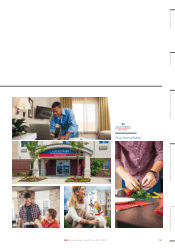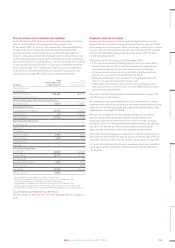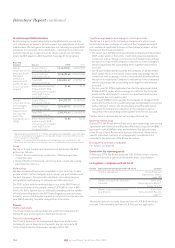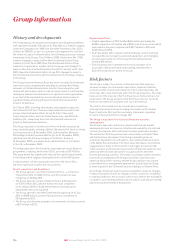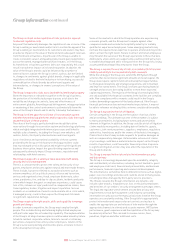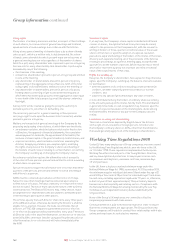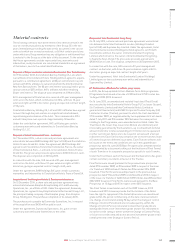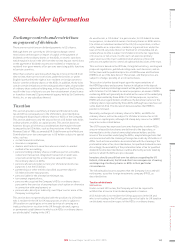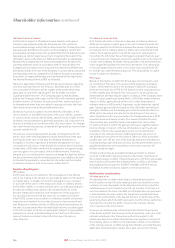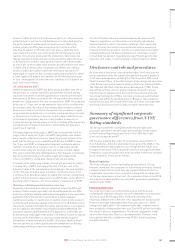Holiday Inn 2015 Annual Report Download - page 159
Download and view the complete annual report
Please find page 159 of the 2015 Holiday Inn annual report below. You can navigate through the pages in the report by either clicking on the pages listed below, or by using the keyword search tool below to find specific information within the annual report.
The Group is exposed to the risk of events that adversely impact
domestic or international travel
The room rates and occupancy levels of the Group could be adversely
impacted by events that reduce domestic or international travel,
such as actual or threatened acts of terrorism or war, political or
civil unrest, epidemics or threats thereof, travel-related accidents
or industrial action, natural disasters, or other local factors impacting
specific countries, cities or individual hotels, as well as increased
transportation and fuel costs. A decrease in the demand for hotel
rooms as a result of such events may have an adverse impact on
the Group’s operations and financial results. In addition, inadequate
planning, preparation, response or recovery in relation to a major
incident or crisis may cause loss of life, prevent operational continuity,
or result in financial loss, and consequently impact the value of our
brands and/or the reputation of the Group.
The Group is exposed to the risks of the hotel industry
supply-and-demand cycle
The future operating results of the Group could be adversely affected
by industry overcapacity (by number of rooms) and weak demand due,
in part, to the cyclical nature of the hotel industry, or other differences
between planning assumptions and actual operating conditions.
These conditions could result in reductions in room rates and
occupancy levels, which would adversely impact the financial
performance of the Group.
The Group is subject to a competitive and changing industry
The Group operates in a competitive industry and must compete
effectively against traditional competitors such as other global hotel
chains, local hotel companies and independent hotels to win the loyalty
of guests, employees and owners. The competitive landscape also
includes other types of businesses, such as web-based booking
channels (which include online travel agents and intermediaries),
and alternative sources of accommodation such as short-term lets
of private property. Failure to compete effectively in traditional and
emerging areas of the business could impact the Group’s market share,
System size, profitability and relationships with owners and guests.
The Group is exposed to risks related to executing and realising
benefits from strategic transactions, including acquisitions
The Group completed the acquisition of Kimpton Hotels & Restaurants
in January 2015 and may seek to make other strategic transactions,
including acquisitions, in the future. The Group may not be able to
identify opportunities or complete transactions on commercially
reasonable terms, or at all, and may not realise the anticipated
benefits from such transactions. Strategic transactions come with
inherent valuation, financial and commercial risks, and regulatory and
insider information risks during the execution of the transactions. In
addition, the Group may face unforeseen costs and liabilities, diversion
of management attention, as well as longer-term integration and
operational risks, which could result in a failure to realise benefits,
financial losses, lower employee morale and loss of talent.
The Group is dependent upon a wide range of external stakeholders
and business partners
The Group relies on the performance, behaviours and reputation
of a wide range of business partners and external stakeholders,
including, but not limited to, owners, contractors, lenders, suppliers,
vendors, joint-venture partners, online travel agents, third-party
intermediaries and other business partners which may have different
ethical values, interests and priorities. Further, the number and
complexity of interdependencies with stakeholders is evolving.
Breakdowns in relationships, contractual disputes, poor vendor
performance, insolvency, stakeholder behaviours or adverse
reputations, which may be outside of the Group’s control, could
adversely impact on the Group’s performance and competitiveness,
delivery of projects, guest experiences or the reputation of the Group
or its brands.
The Group is exposed to increasing competition from online travel
agents and intermediaries
A proportion of the Group’s bookings originate from large
multinational, regional and local online travel agents and
intermediaries with which the Group has contractual arrangements
and to which it pays commissions. These websites offer a wide breadth
of products, often across multiple brands, have growing booking and
review capabilities, and may create the perception that they offer the
lowest prices. Some of these online travel agents and intermediaries
have strong marketing budgets and aim to create brand awareness
and brand loyalty among consumers and may seek to commoditise
hotel brands through price and attribute comparison. Further, if these
companies continue to gain market share, they may impact the
Group’s profitability, undermine the Group’s own booking channels
and value to its hotel owners, and may be able to increase commission
rates and negotiate other favourable contract terms.
The Group is exposed to a variety of risks related to identifying,
securing and retaining franchise and management agreements
The Group’s growth strategy depends on its success in identifying,
securing and retaining franchise and management agreements.
This is an inherent risk for the hotel industry and the franchise
business model. Competition with other hotel companies may
generally reduce the number of suitable franchise, management and
investment opportunities offered to the Group and increase the
bargaining position of property owners seeking to become a
franchisee or engage a manager. The terms of new franchise or
management agreements may not be as favourable as current
arrangements; the Group may not be able to renew existing
arrangements on similarly favourable terms, or at all.
There can also be no assurance that the Group will be able to identify,
retain or add franchisees to the IHG System or to secure management
contracts. For example, the availability of suitable sites, market
saturation, planning and other local regulations or the availability
and affordability of finance may all restrict the supply of suitable
hotel development opportunities under franchise or management
agreements. In connection with entering into franchise or
management agreements, the Group may be required to make
investments in, or guarantee the obligations of, third parties or
guarantee minimum income to third parties. There are also risks
that significant franchisees or groups of franchisees may have
interests that conflict, or are not aligned, with those of the Group,
including, for example, the unwillingness of franchisees to support
brand improvement initiatives. This could result in franchisees
prematurely terminating contracts which would adversely impact
the overall IHG System size and the Group’s financial performance.
The Group is exposed to inherent risks in relation to changing
technology and systems
As the use of the internet and mobile technology grows and customer
needs evolve at pace, the Group may find that its evolving technology
capability is not sufficient and may have to make substantial additional
investments in new technologies or systems to remain competitive.
Failure to keep pace with developments in technologies or systems
may put the Group at a competitive disadvantage. In addition, the
technologies or systems that the Group chooses to deploy may not
be commercially successful or the technology or system strategy may
not be sufficiently aligned with the needs of the business. As a result,
this could adversely affect guest experiences, and the Group may lose
customers, fail to attract new customers, incur substantial costs or
face other losses. This could further impact the Group’s reputation
in regards to innovation.
STRATEGIC REPORT GOVERNANCE GROUP FINANCIAL STATEMENTS ADDITIONAL INFORMATIONPARENT COMPANY FINANCIAL STATEMENTS
157IHG Annual Report and Form 20-F 2015



